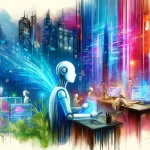Alright, folks. We’ve all heard the classic tech promises that never quite arrive. You know the ones—flying cars, fusion energy, hoverboards… and now, apparently, AI taking over software development. It’s like we’ve been promised a perpetual vacation, but we’re all still stuck at our desks. But what if, this time, it’s not just smoke? What if the coding apocalypse is real and our computers are sharpening their digital pencils to take over? That’s exactly what Amazon’s CEO, Matt Garman, was hinting at in a recently “leaked” internal chat.
Spoiler: This “leak” is about as accidental as your mom ‘accidentally’ finding the stash of candy you thought you hid in the laundry room. So let’s break it down—because there’s a lot to unpack here.
The Future: Code or Copium?
First things first—Garman says most developers may soon have to “develop other skills” because, well, AI will handle coding. Now, does this sound like the same wishful thinking that said we’d all be gliding through the air on hoverboards by 2025? Absolutely. But this is Amazon, so maybe we should at least pretend to take it seriously. The talk about AI replacing coders is similar to those old promises about fusion energy. It’s always “just around the corner,” but you’ll still be flipping light switches and coding functions in Python.
Think about it—when was the last time one of these tech revolutions arrived on schedule? Quantum computing? Yeah, that was supposed to change the world ten years ago, but here we are, still waiting for it to figure out how to reliably beat a decent chess app.
The Leak: Definitely ‘Accidental’
This “leaked” recording of Amazon’s Matt Garman? Oh, so accidental. Because massive tech companies just love letting their internal strategies leak out, right? Sure. According to Business Insider, Garman talked about AI taking over most coding tasks during an internal fireside chat. If you didn’t roll your eyes at the term “fireside chat,” you’re clearly not paying attention. Nothing says “disruptive innovation” like a bunch of executives sitting around a fake campfire pretending to have a casual chat.
Coding is Dead? Not So Fast…
Let’s get real. This isn’t the first time we’ve heard that developers are about to be put out of work by AI. Remember when we were told that no one would need to learn English because Google Translate would make everyone a polyglot? How’s that working out for you? Exactly.
Now, let’s put this in perspective: Amazon has spent billions on AI. Of course, they want to believe AI can replace developers. It’s like buying a $5,000 treadmill and convincing yourself you’re suddenly going to run a marathon. But the treadmill (or AI) won’t magically make you an athlete—or replace your dev team.
If we follow this logic, what will Amazon and other big tech companies do when AI takes over coding? Here’s the deal: they won’t lay off developers; they’ll just ask them to churn out more code, faster. Why? Because the rate of software production will skyrocket. Think of it as moving from a typewriter to a word processor—you can create more content, but someone still has to press the keys.
“Develop Other Skills,” They Say…
So what are these mysterious “other skills” we’re supposed to learn? Is Amazon suggesting that developers start learning how to touch grass instead of code? If so, I’ll pass. After spending hours at my kid’s soccer game under the blazing sun, I’ve had my fill of grass, thank you very much.
No, what they really mean is that coders will need to shift their focus from typing out lines of code to figuring out what to build and why. In Garman’s words, the skill set will become “more in tune with customer needs.” Translation: They’ll still need you, but now they want you to be more of a mind-reader and less of a keyboard warrior.
The Real Reason for AI Hype
The cynical take? Big companies, like Amazon, are pouring billions into AI development and hardware like Nvidia’s H100 chips. Naturally, they’re hoping AI can justify the investment. Garman and other CEOs are pushing this narrative because it’s in their financial interest. Cut developer costs, increase AI productivity—sounds great on paper.
But here’s the kicker: even if AI starts writing code, companies aren’t going to save money by cutting developers. They’ll just build more stuff, faster. And that’s going to need more developers to maintain and refine it all. AI may take over some tasks, but software development is far from dead. It’s just evolving. Companies will still need human brains to innovate, troubleshoot, and make the tough calls.
What’s Next for Developers?
Let’s assume, for a second, that Garman is right and AI starts writing flawless code. What happens next? Will we all become obsolete? Probably not. Coding is like the language we use to communicate with computers. It’s not just about typing commands—it’s about problem-solving, designing systems, and innovating.
Remember how the rise of low-code platforms was supposed to eliminate the need for developers? Yeah, that didn’t happen. Instead, we got more developers, just working at a higher level of abstraction. AI will likely do the same thing—it’ll handle the mundane tasks, while developers will focus on the bigger picture.
Sure, junior developers might have to hustle a bit harder to stand out, but it’s not “over” for them. Think about it—if AI really does make coding easier, it will free up developers to work on more creative and complex problems. It’s the same as when Photoshop made photo editing easier: the really creative people still found ways to stand out.
AI is a Programmer, Too?
According to Nvidia’s Jensen Huang, "everyone is a programmer now." Right, and everyone is also a carpenter because they have access to a hammer. The idea that just anyone can jump into coding because AI can assist is like saying everyone can cook because they have a microwave. Sure, AI can help, but there’s still a huge difference between heating up leftovers and creating a gourmet meal.
And while we’re on the subject, let’s give a nod to Satya Nadella, Microsoft’s CEO, who speculated that AI will create one billion developers. Great news for humanity, right? But let’s be real—having access to a tool doesn’t automatically make you a master. You might be able to write a basic app with AI’s help, but that doesn’t mean you’re suddenly going to land a senior engineer position at Amazon.
The Reality: More Code, Not Less
The truth is, even if AI makes developers more productive, it’s not going to reduce the demand for their skills. In fact, it’ll likely increase the demand. Companies are always hungry for more innovation, more products, more features. AI will help speed up the process, but humans will still need to guide the ship.
As for the “job extinction” Garman alluded to? Don’t bet on it. If anything, developers will shift from writing code to building and managing the systems that generate code. They’ll still be essential, just in different ways.
And remember, coding isn’t just about syntax—it’s about knowing what to build and why. AI might be able to generate code, but it can’t think creatively or innovate the way humans can (yet). So, developers: your jobs are safe for now. You might just need to tweak your skill set a bit.
What Do You Think About AI Taking Over Coding?
So, here’s the big question: Do you really believe that AI is going to replace software developers, or is this just another case of tech over-promising and under-delivering? Can AI truly understand creativity, problem-solving, and the nuances of human innovation? Or is it just another tool that we’ll use to enhance our skills rather than replace them?
What about the broader implications for the job market? If AI starts handling the mundane tasks, does that free us up for more creative, fulfilling work? Or are we heading into an era where humans are sidelined by machines?
I’d love to hear your thoughts on this! Drop a comment below and let’s have a real conversation about the future of tech and what it means for developers, companies, and the rest of us. Let’s debate: Is this the dawn of a new AI-powered utopia, or is it just another step in an ever-evolving industry?
Join the iNthacity community today! Claim your citizenship in the "Shining City on the Web!" Like, share, and become part of the debate. Whether you’re a coder, tech enthusiast, or just curious about where the world is heading, your voice matters. Let’s shape the future together—one comment, one discussion, and one article at a time!
























1 comment